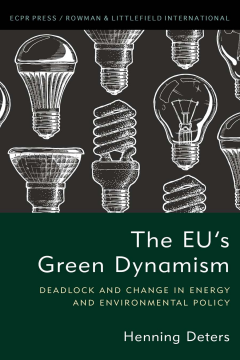
Additional Information
Book Details
Abstract
The high voting threshold in the Council together with conflicting national preferences should frustrate effective European problem-solving. This famous prediction of the "joint-decision trap" (JDT) is at odds with Europe's dynamic environmental policy. Yet there is scarce research on the limited impact of the JDT in this realm. We know little, therefore, about the conditions of effective environmental policy-change in the EU.
By comparing cases of stability and change, including CO2-limits for passenger cars and the phase-out of inscandescent lamps, the book examines the ways in and out of the JDT in environmental policy. It shows how both the highly politicized summit level and the bureaucratic "comitology" facilitate change by acting as informal bypasses to the Council. The book contributes to a better understanding of the JDT. It speaks to the recent debate about Europe's "new intergovernmentalism" and the reliance on "informal politics," especially in the wake of the Euro crisis.
This book makes a timely and fresh contribution to the study of EU environmental policy. It provides new theoretical and empirical insights on the factors constraining and driving the policy innovation and progress. A highly interesting read for students of EU environmental policy and EU policy-making in general.
Christoph Knill, Professor in Political Science, Ludwig-Maximilians-Universität München
Hennng Deters is Assistant Professor at the Institute for European Integration Research (EIF), University of Vienna.
Amidst a Union struggling with multiple crises, this book shows why the EU fares much better than nation states in meeting the biggest challenge yet: environmental degradation. Detailed case studies on energy efficiency allow Deters to discover different mechanisms that overcome the joint-decision trap. His carefully researched and insightful analysis how compromise can build on diverse national preferences is timely.
Susanne K. Schmidt, Professor, University of Bremen
This book offers a novel twist on the well-known claim that the EU has to escape a series of internal political traps that are ever present. By drawing on careful process tracing analyses of three little studied energy efficiency laws, Deters reveals how actors work together to achieve this and in so doing, opens up a fascinating new research agenda covering the revision of existing policies.
Andrew Jordan, Tyndall Centre, University of East Anglia
Often, but not always, the EU is able to forge green policies beyond the preferences of the least ambitious. This book not only provides new insight into the mechanisms for bypassing joint-decision traps, it is also noteworthy for its skillful analysis of the conditions for variance in progress across novel areas of energy efficiency. Recommended reading!
Jon Birger Skjærseth, The Fridtjof Nansen Institute, Norway
Amidst a Union struggling with multiple crises, this book shows why the EU fares much better than nation states in meeting the biggest challenge yet: environmental degradation. Detailed case studies on energy efficiency allow Deters to discover different mechanisms that overcome the joint-decision trap. His carefully researched and insightful analysis of how compromise can build on diverse national preferences is most timely.
Susanne K. Schmidt, Professor, University of Bremen
Table of Contents
| Section Title | Page | Action | Price |
|---|---|---|---|
| The EU’s Green Dynamism | Cover | ||
| Contents | v | ||
| Acknowledgements | vii | ||
| Acronyms | ix | ||
| 1 Environmental Policy in a Trap? | 1 | ||
| 2 Framework of Analysis | 17 | ||
| 3 The Energy Efficiency Directive: A Tale of Thwarted Ambitions | 45 | ||
| 4 Efficient Cars: The Fuel-Saving Regulation | 69 | ||
| 5 Efficient Appliances: The Lamps Regulation | 101 | ||
| 6 Bypassing Joint-Decision Traps in EU Environmental Policy | 127 | ||
| References | 155 | ||
| Appendix | 173 | ||
| Index | 175 | ||
| About the Author | 179 |
